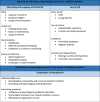Impact and experiences of vestibular disorders and psychological distress: Qualitative findings from patients, family members and healthcare professionals
- PMID: 37915279
- PMCID: PMC10757133
- DOI: 10.1111/hex.13906
Impact and experiences of vestibular disorders and psychological distress: Qualitative findings from patients, family members and healthcare professionals
Abstract
Introduction: People with vestibular disorders frequently experience reduced quality of life and challenges with activities of daily living. Anxiety, depression and cognitive problems often co-present with vestibular disorders and can aggravate symptoms and prolong clinical recovery. We aimed to gain in-depth insights into the impact of vestibular disorders and the contribution of psychological factors by exploring multistakeholder perspectives.
Methods: Semistructured interviews were conducted between October 2021 and March 2022 with 47 participants in the United Kingdom including: 20 patients (age M = 50.45 ± 13.75; 15 females), nine family members (age M = 61.0 ± 14.10; four females), and 18 healthcare professionals. Data were analysed using framework analysis.
Results: Vestibular disorders impact diverse aspects of patients' lives including work, household chores, socialising, and relationships with family and friends. Being unable to engage in valued activities or fulfil social roles contributes to feelings of grief and frustration, affecting identity, confidence, and autonomy. Anxiety and low mood contribute to negative thought processes, avoidance, and social withdrawal, which can impede clinical recovery through reduced activity levels, and end engagement with treatment. Coping strategies were thought to help empower patients to self-manage their symptoms and regain a sense of control, but these require oversight from healthcare providers.
Conclusions: Daily activity limitations, social participation restrictions, and psychological distress can interact to impact quality of life, sense of self, and clinical recovery amongst people with vestibular disorders. Information and resources could aid societal awareness of the impact of vestibular disorders and help patients and families feel understood. An individualised and comprehensive approach that concurrently addresses mental, physical, social, and occupational needs is likely to be beneficial.
Patient or public contribution: Two group meetings were held at the beginning and end of the study with a patient and public involvement network formed of people with vestibular disorders and family members. These individuals commented on the study aims, interview schedule, participant recruitment practices, and interpretation of the themes identified. Two core patient members were involved at all stages of the research. These individuals contributed to the formulation of the interview schedule, development and application of the coding scheme, development and interpretation of themes, and preparation of the final manuscript.
Keywords: activities of daily living; framework analysis; psychological distress; quality of life; vestibular disorders.
© 2023 The Authors. Health Expectations published by John Wiley & Sons Ltd.
Conflict of interest statement
The authors declare no conflict of interest.
References
-
- Neuhauser HK. The epidemiology of dizziness and vertigo. Handb Clin Neurol. 2016;137:67‐82. - PubMed
-
- Murdin L, Schilder AG. Epidemiology of balance symptoms and disorders in the community: a systematic review. Otol Neurotol. 2015;36(3):387‐392. - PubMed
-
- Agrawal Y, Carey JP, Della Santina CC, Schubert MC, Minor LB. Diabetes, vestibular dysfunction, and falls: analyses from the National Health and Nutrition Examination Survey. Otol Neurotol. 2010;31(9):1445‐1450. - PubMed
-
- Biju K, Oh E, Rosenberg P, et al. Vestibular function predicts balance and fall risk in patients with Alzheimer's disease. J Alzheimer's Dis. 2022;86(3):1159‐1168. - PubMed
Publication types
MeSH terms
Grants and funding
LinkOut - more resources
Full Text Sources
Medical


